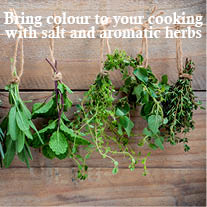Bring colour to your cooking with salt and aromatic herbs

The Portuguese population consumes about twice the amount of salt, which
is recommended by the World Health Organization (5 g / day), making it a
priority to reduce their use in food, with herbs being a great
alternative.
According to the Directorate-General for Health (2013),
the current high salt intake is a major cause of hypertension and,
consequently, blood vessels and brain diseases such as stroke and
myocardial infarction, also increasing the risk of diseases by renal
failure, making it a major risk factor for health.
As an alternative
to the consumption of salt, we can use aromatic herbs in our kitchen,
since they enhance the taste, smell and even the color of foods,
bringing benefits in a positive way to our health. They can be used in
the preparation or seasoning of salads, marinades, soups, meats, fish,
teas, jams, among others and also, can be used fresh or dried, although
when dried they loose some of their properties.
They provide various
nutrients, such as proteins, vitamins, minerals, fibers, essential oils
and other substances, which act to prevent the onset of cancer,
cardiovascular, reproductive and nervous system functioning, and may
also help the digestive and immune system. Some are also known for their
excellent antioxidant action, such as oregano, thyme, parsley, sage,
basil, among others.
CHARACTERISTICS OF AROMATIC HERBS
Celery:
It has a slightly salty taste, and a single stem is enough to flavour
the food. Used in soups, salads, boiled, stewed or sautéed meat.
Rosemary:
It has a sweet and fresh taste. Used in the preparation of pork and
lamb marinades, it can flavour the cooking water of pasta, potatoes,
rice, tomato sauces, salads and flavoured butters.
Garlic: Enhances
the flavour of meals due to its aromatic essences, it can be used
crushed, chopped or sliced. Used to season sauteed and seasoned meat,
fish, vegetables and also cooked in the preparation of rice, beans,
pizzas and soups.
Onions: Can be used in a variety of ways, as a
single ingredient or as a seasoning, whether fried, braised, baked, or
salted. It is an excellent salt substitute.
Coriander: It has a
special and characteristic aroma, which combines very well with all
types of fish. Both fresh leaves, stems and even their seeds are used.
Used in salads, fish broths, rice, peas, beans, soups and sauces.
Dill:
Both its leaves and its stem can be used, which impart a strong, spicy
and appetizing flavour to the food. Used in the preparation of soups,
salads, fish and rice.
Tarragon: It has a very strong flavour, and is usually used in the preparation of vinaigrettes, fish, salads, sauces, omelettes.
Fennel
leaves / Fennel bulb: Both its leaves, its stem and flowers are used in
the preparation of salads, gratin or sauteed sauces, tea and sweet
dishes.
Ginger: It has a very spicy and intense flavour,
powdered, fresh, dry, in syrup, crystallized or in frozen paste. Used in
the preparation of meats and fish, drinks and natural juices, teas,
soups, salads, among others.
Mint: Also known as mint, it has a pure
smell and intense and refreshing flavour. Used to flavour drinks,
seasoning of savoury dishes and meats, soups, salads and also in the
manufacture of sweets.
Bay leaf: The leaves are very aromatic and
have a more intense flavor after they dry. Used in the seasoning of
meats (pork), fish, and in the preparation of soups, beans, eggs and
boiled potatoes.
Basil: The younger the shoots, the more intense
their taste and smell. It should be added in previously prepared dishes
of meat, fish, soups, pasta, cooked with tomatoes and flavored vinegars.
Oregano:
It has an intense, strong and aromatic flavour. Used to aromatize fresh
tomato salads, tomato-based sauces, cheese dishes, meat, fish, pasta,
stews or sauté dishes.
Salsa: Its leaves have an intense and aromatic flavour. It should be consumed raw, flavouring soups, salads, fish, meat, eggs.
Thyme: It smells very smooth, similar to mint. Of its nutritional composition stand out the vitamins B and C and the magnesium.
HOW TO BUY AND SAVE AROMATIC HERBS
When
buying herbs, you should always choose fresher and more fragrant, for
greater durability, wrap your stem in damp absorbent paper or a piece of
cloth and store in a plastic bag in the refrigerator.
They can also
be cut and stored in the freezer, however, they may lose some of their
properties, since ice crystals are formed, causing them to lose their
aromatic power.
Dina Carção - Nutritionist (2890N)

green card - dried leguminous plants
For the Mercearia Bio Green Card hol...
Read article



